It has become tradition to sound alarm bells in the months leading up to an Olympic Games. Before the last go-round, Sochi for example, cries of crisis came often: Venues built on protected lands. Swollen budgets tied to crime syndicates. Illegal dumping and contaminated water. Anti-gay legislation and hate crimes. Pussy Riot. And stray dogs, everywhere.
But good luck finding an example of a truly noble Olympics. Politics take a toll because the Olympics are never free and clear of their political moment.
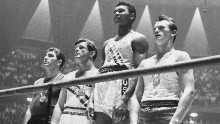
27 photos: Photo finish: The history of the Olympics
1960, Rome – Before he was "The Greatest," Muhammad Ali was Cassius Clay, a modern-day gladiator who won boxing's light heavyweight gold medal in Italy's historic capital.
Hide Caption
14 of 27
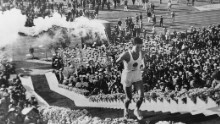
27 photos: Photo finish: The history of the Olympics
1964, Tokyo – The lighting of the torch was particularly poignant as Yoshinori Sakai -- born in Hiroshima on August 6, 1945, the day an atomic bomb was dropped on the Japanese city -- ignited the cauldron.
Hide Caption
15 of 27
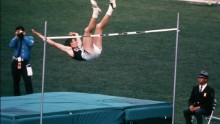
27 photos: Photo finish: The history of the Olympics
1968, Mexico City – American Dick Fosbury changed the high jump forever by claiming the gold medal with his revolutionary "Fosbury Flop" technique. It has since become the dominant technique in the event.
Hide Caption
16 of 27
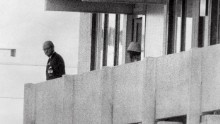
27 photos: Photo finish: The history of the Olympics
1972, Munich – The Games paled into insignificance after members of the Palestinian terrorist group Black September broke into the Olympic Village, killed two Israeli athletes and took nine hostage. Those captured died during a failed rescue attempt by German authorities.
Hide Caption
17 of 27
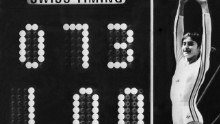
27 photos: Photo finish: The history of the Olympics
1976, Montreal – Nadia Comaneci may have only been 14, but the Romanian gymnast scored a "perfect 10" on her way to winning three gold medals in Canada. The scoreboard could only display three digits, so her score went up as 1.00.
Hide Caption
18 of 27
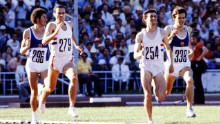
27 photos: Photo finish: The history of the Olympics
1980, Moscow – While these Games are largely remembered for a U.S. boycott over the Soviet war in Afghanistan, they also featured an almighty battle between two British middle-distance runners. Steve Ovett took gold over his rival Sebastian Coe in the 800m, despite the latter holding the world record over the distance. Ovett was heavy favorite going into the 1500m and boasted a 45-race winning streak, but Coe avenged his earlier defeat as his compatriot finished third.
Hide Caption
19 of 27
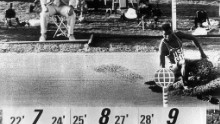
27 photos: Photo finish: The history of the Olympics
1984, Los Angeles – Carl Lewis ran and jumped into Olympic history in the absence of the boycotting Eastern Bloc nations. He won four gold medals across sprinting and the long jump to equal the haul of his fellow American Jesse Owens in Berlin 48 years earlier.
Hide Caption
20 of 27
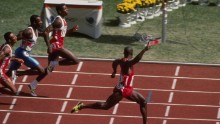
27 photos: Photo finish: The history of the Olympics
1988,Seoul – Ben Johnson stunned the world by taking 100m gold in a record time in South Korea, but the Canadian left the Olympic movement in turmoil when he later tested positive for a banned substance.
Hide Caption
21 of 27
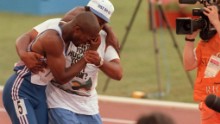
27 photos: Photo finish: The history of the Olympics
1992, Barcelona – Derek Redmond broke down in tears during the semifinals of the men's 400m in Spain. The Briton had been one of the favorites to win gold but he succumbed to injury midway through his race. After refusing to be carried on a stretcher, Redmond's father Jim carried him over the finish line -- providing one of the most heartbreaking, and abiding, Olympic images.
Hide Caption
22 of 27
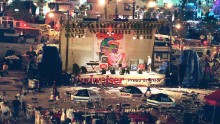
27 photos: Photo finish: The history of the Olympics
1996, Atlanta – Two people died as a result of a terrorist bombing, and more than 100 others were injured, as the U.S. hosted the first Summer Games to be held in a different year from the Winter version. Eric Robert Rudolph was convicted of placing the 40-pound bomb, filled with nails and screws, in Centennial Olympic Park. Alice Hawthorne, 44, of Albany, Georgia was killed by the explosion while Turkish cameraman Melih Uzunyol died of a heart attack as he rushed to film the scene.
Hide Caption
23 of 27
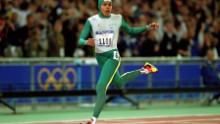
27 photos: Photo finish: The history of the Olympics
2000, Sydney – Cathy Freeman delighted Australian fans by winning the women's 400m, becoming the first athlete to light the Olympic torch and take a gold medal at the same Games.
Hide Caption
24 of 27

27 photos: Photo finish: The history of the Olympics
2004, Athens – The deterioration of the softball stadium for the Athens 2004 Games reflects the problems some countries encounter when trying to establish a lasting Olympic legacy. This picture was taken in July 2014.
Hide Caption
25 of 27
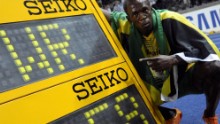
27 photos: Photo finish: The history of the Olympics
2008, Beijing – China's first Olympics was all about Usain Bolt. The Jamaican sprinter wowed the world, setting records in both the 100m and 200m en route to gold medals before adding the 4x100m relay title to his haul. Four years later in London, Bolt completed the "Double Triple" by winning all three gold medals again.
Hide Caption
26 of 27

27 photos: Photo finish: The history of the Olympics
2012, London – The opening ceremony set the tone for a Games which captivated the British public. Film director Danny Boyle orchestrated the spectacular display, which included the Queen skydiving with James Bond and David Beckham cruising down the Thames. Bonkers, and British.
Hide Caption
27 of 27

No comments:
Post a Comment